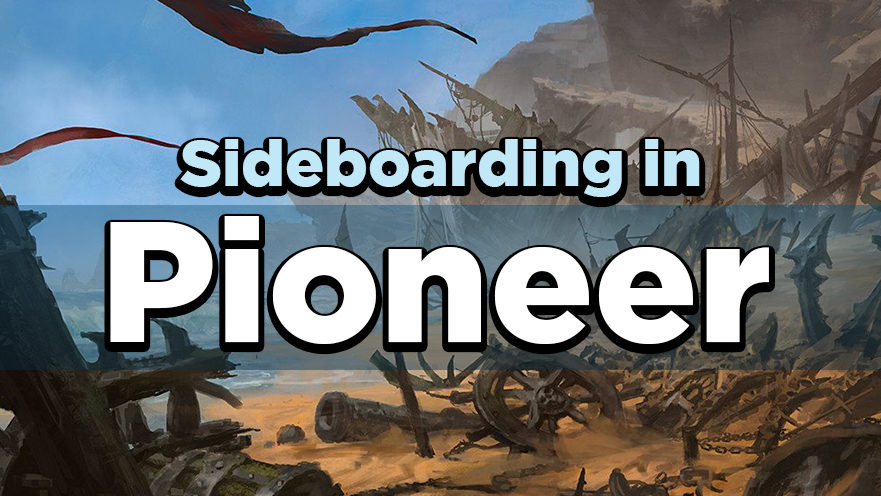A sideboard to your deck.
A paintbrush to your canvas.
A hammer to your smithing.
…That’s all I got.
Sideboarding is important because your maindeck can’t cover everything. Sometimes you need some fine-tuning to cover weak points against a match-up, a particular card, or even a player! Sideboard cards can vary from high impact but narrow answers — such as Fry — to broad answers that can deal with a slew of things — like an additional sweeper against creature decks, or another catch-all counterspell for good measure.
The Pillars of Pioneer
This practice does not change in Pioneer, for the most part. Pioneer offers so many sideboarding tools that it can be difficult to pin down what you need to attack, and what you need to defend against. Understanding what makes the format tick is a great place to start. Here are some pillars to keep in mind:
Treasure Cruise
Dig Through Time
Smuggler’s Copter*
Hour of Promise
Field of the Dead*
Hardened Scales
Ensoul Artifact
Nissa, Voice of Zendikar
Nissa, Who Shakes the World
Wild Slash
Teferi, Time Raveler
Oko, Thief of Crowns
Once Upon a Time*
Arclight Phoenix
Walking Ballista
Thoughtseize
Llanowar Elves
Elvish Mystic
Gilded Goose
Fatal Push
These cards are crucial to the metagame. Your sideboard should allow you to adapt to your opponent’s game plan, as well as reinforce your own. This format is both aggressive and disruptive, so it’s important to understand the purpose of your sideboard cards. Generally, aggressive metagames call for impactful ways to slow things down, and disruptive metagames require ways to get around disruption or push through it.
Delving further, you can separate these pillars into distinct categories: threats, enablers, payoffs, and answers.
Threats
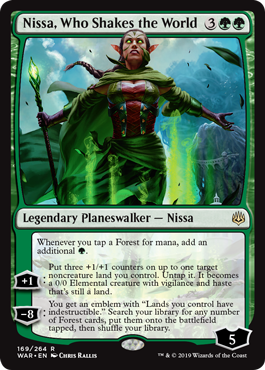
The threats in Pioneer are vast and encompass many different card types, and they demand different answers. Those answers need to be robust and provide some type of value, and they should preferably be evasive.
Enablers
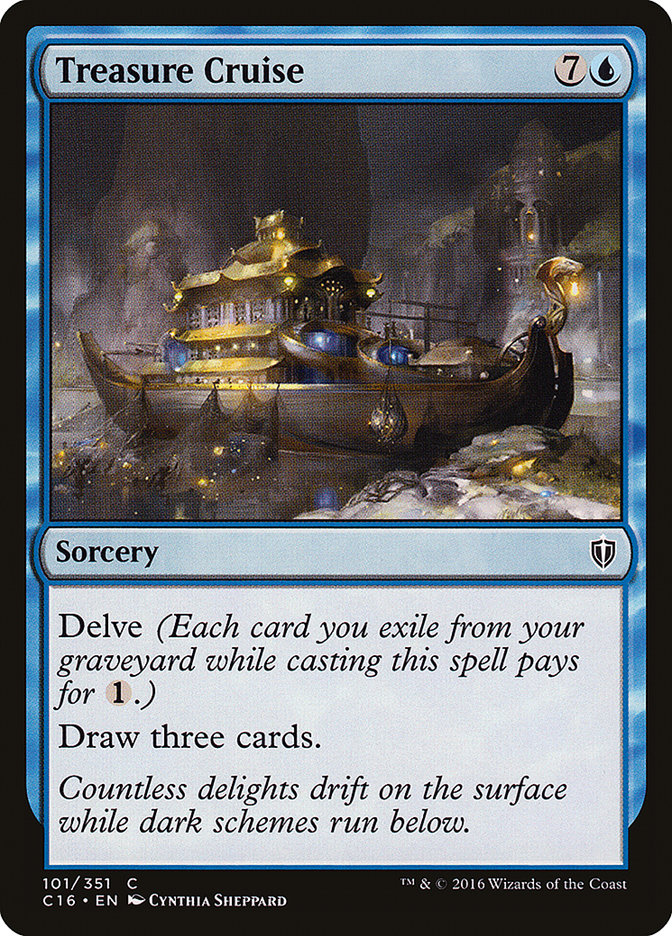
Enablers help ensure that you can execute your game plan, and they need to be as efficient as possible within the context of the deck you’re playing. Elvish Mystic and Llanowar Elves enable fast starts, Treasure Cruise enables snowballing for Arclight Phoenix, and Hardened Scales gives your threats added power.
Payoffs
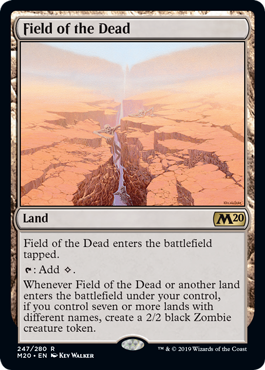
Payoffs are generally the reason why you’re playing a given deck in the first place. “Threats” and “payoffs” can be used interchangeably in some cases, as with Walking Ballista, Arclight Phoenix, and Field of the Dead* in their respective decks. But they can also be among a slew of other threats in your strategy, or simply the results of your enablers doing their thing.
Answers
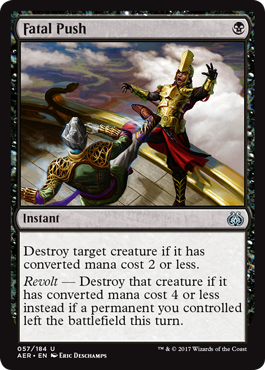
The answers are just that: ways to deal with threats, enablers, and/or payoffs. They can be broad, or they can answer specific colors, cards, or lines of play.
While these aren’t always set rules, these are good building blocks of approaching a good sideboard. Keeping all of this in mind, here are some examples of lesser known cards that fit the aforementioned categories, and will help you navigate the format effectively.
Magma Spray
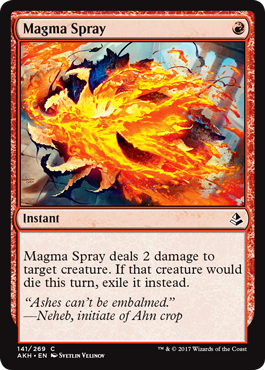
With the rise of Mono-Black Aggro, the persistence of Arclight Phoenix, and the lack of Nexus of Fate and other Fog-based decks, Magma Spray is a strong contender for the sideboard that could replace Wild Slash and other similar effects. Not being able to hit players is a real thing, especially if your deck is hyper aggressive like Mono-Red. However, being able to get a Gutterbones or Scrapheap Scrounger gone for good may save you a number of turns throughout a game, which is more than worth the trade-off.
Disdainful Stroke
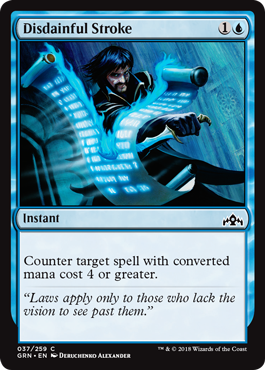
Counterspells carry a fair risk in Pioneer, since Teferi, Time Raveler suppresses them. Smuggler’s Copter* and mana dorks also help get around them as well, rendering countermagic even less effective. Disdainful Stroke is particularly powerful because the decks it answers don’t generally play Teferi, and the payoffs those decks play are so powerful and broad that you need a clean and elegant answer. Disdainful Stroke does the job, does it well, and does it for cheap.
Thought-Knot Seer
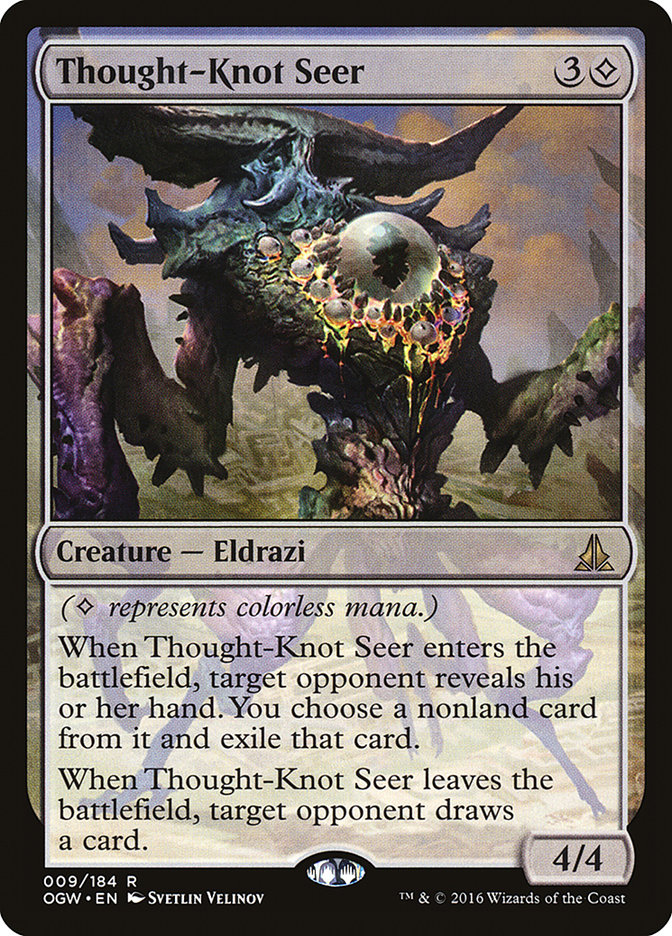
I know, I sort of have a soft spot for Eldrazi, but I legitimately feel that stompy decks would greatly benefit from this card. Having an efficient and disruptive creature, especially with a low mana requirement, is a big deal. All Oko-based stompy decks could use a little bit of beef in the middle, and Thought-Knot Seer is the perfect fit in grindy match-ups.
Settle the Wreckage
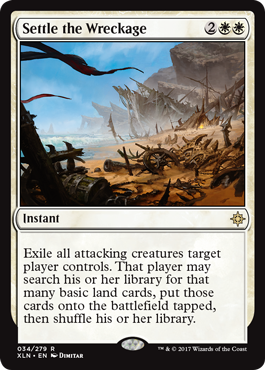
“They never play around it.”
This card is one of the more mind-wracking cards to look out for, and that’s assuming your opponent even has it on their radar! Settle the Wreckage can be good in quite a few situations. At worst, Settle the Wreckage will buy you a turn. At best, it will completely turn the game around for you. All in exchange for some basic lands for your opponent – a fine deal for a fine sideboard card.
Solemnity
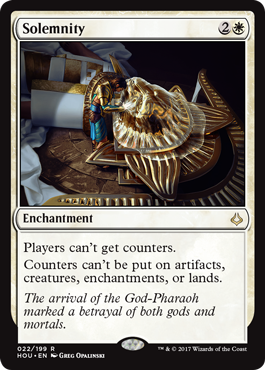
Hardened Scales is one of the best decks in the format, and there are many decks that rely on putting counters on creatures. Thankfully, Solemnity makes that much more manageable. Three mana can be a tad slow on the draw, but if you’re playing this sort of card, there’s a good chance that you’re playing a slower deck (or casting spells on your opponent’s turn). In either case, this card helps stymie the likes of Walking Ballista, Hangarback Walker, and Stonecoil Serpent.
Experimental Frenzy
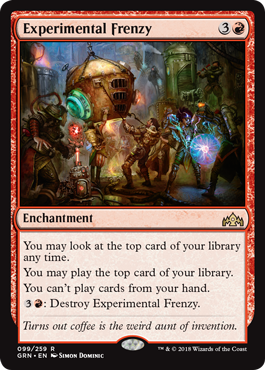
How many of these aggressive decks could benefit from a big rebound-like spell?
The correct answer is all of them!
If your deck is lower to the ground and you need a way to rebuild your board, this is your card. Ensoul decks, Mono-Red, Jeskai Ascendancy, and any prowess-based deck will want this card as a way to spiral games out of control. If you have a low curve, or a way to tear through the top of your library, Frenzy will allow you to see as many cards as possible. It is a bit unwieldy at times (sometimes you hit several lands in a row), but it’s definitely worth the investment in decks that need to keep their board presence.
These are just a few cards that are positioned to stand out in Pioneer. The metagame is settling quite nicely, and I expect these cards to be a major player in the coming weeks! Give these cards a shot if your metagame calls for it and let us know if any of these cards worked out well (or if they didn’t!) I know I’ll be working hard on each of these cards, and then some!
Editor’s Note: Once Upon a Time, Smuggler’s Copter, and Field of the Dead were banned in Pioneer on December 2, 2019.

Anthony Lowry is a high level competitor in several games, and Magic is no exception. His newfound passion for deckbuilding has reignited his drive to compete and test his skill against the best.

